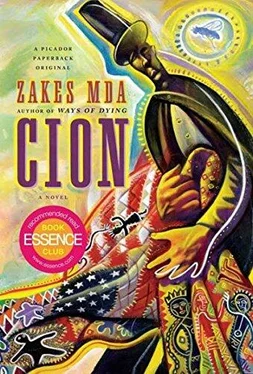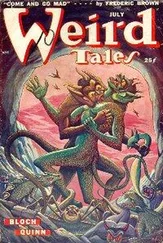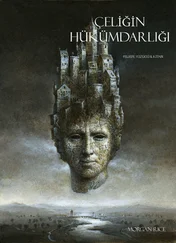I believe Ruth: this “girl,” she’s got issues. Mostly with me, from the way she behaves toward me. I do not know what I ever did to her. Does she perhaps resent the attention that her mother is paying me?
I must say a strong bond has developed between us. Ruth and me. I have become her sounding board. When she is frustrated by her children’s inertia she talks to me about it. She calls me to her table as she creates her quilts and asks me earnestly what I think is wrong with her children, after she did so much for them. Why do I think they are repaying her this way? I don’t usually have answers for such questions. It is clear to me anyway that she does not expect answers. She never complains about Mahlon Quigley even though he spends his days staring motionlessly at his garden or brooding with the other elders on the porch of the Kilvert Community Center. Instead, she would rather complain about politicians, and would ask me why I think they are all such a scandalous breed, except of course the one politician very dear to her heart. I voice my opinion only in those instances when I agree with her point of view. In all other instances, which are by far in the majority, I keep my opinion to myself. And this has earned me the honor of being referred to as a good listener by her. And of being called “Ruth’s African” by the neighborhood.
I learned of this nickname on my first visit to the Kilvert Community Center. I wandered there on my own one day when Ruth was busy with her quilting, Mahlon was tending his garden by shifting the positions of his little American flags, Orpah was buried in her room doing God-knows-what and Obed was whooping it up in Athens. I passed three brooding elders sitting on old car seats on the porch despite the chill. As I opened the door I heard one of them tell the others: “That’s him all right…Ruth’s African.” They squinted to take a thorough look at me. One gave me a toothless grin and I smiled back at them.
Inside the hall were many, probably a hundred or more, bales of clothes in black plastic bags. Two middle-aged women — one quite stout and round, the other slim and sinewy — sat on a bale each, sorting out the clothes. A young woman sat at one of the long tables in the room, punching something on the computer.
I greeted and offered to help.
“He’s Ruth’s African,” said the young woman.
“My name is Toloki,” I said. “Toloki from South Africa.”
“He’s a professional mourner,” said the young woman, flaunting her knowledge of me to the other women, who didn’t seem to grasp the significance of my occupation and to place it in the grand scheme of things.
“We hear so much about you,” said the slender one. “Welcome to the Center.”
The plastic bags reached almost to the ceiling and it was obvious that the ladies needed a hand to move them about. The young lady at the computer told me her name, and that she was a volunteer from Athens who occasionally helped with the Center’s books. The two ladies at the bales introduced themselves as Irene Flowers and Barbara Parsons. Irene was the slender one. “She’s almost eighty years, you know?” said Barbara. I could understand why Barbara took such pride in Irene’s age that she would announce it unprovoked to a stranger. Irene looked fifty-five at most. That’s why I thought she was middle-aged. I expressed my surprise at her youthful looks.
“It’s because of onion,” she said.
“She eats one raw onion every day,” said Barbara.
“Been doin’ it since I was a girl,” Irene chipped in.
I promised them that from then on I was going to eat raw onion every day, although it might be too late to save me as they could see from my battered looks. They laughed at this and flattered me, saying that I still looked handsome for my age. Of course they knew nothing about my age.
Irene’s onion was quite a coincidence. Those of you who know me from Ways of Dying will remember that a diet of raw onion and Swiss roll used to be a special treat for me.
“As a matter of fact I had the onion habit too once upon a time,” I told the women. “I am tempted to resume it so as to look young and beautiful like Irene.”
They laughed once more because they thought I was just joking.
The onion and Swiss roll habit is one of those things I lost when Noria — the late and lamented love of my life — became my habit.
Irene was proud to show me around as Barbara focused on sorting the clothes and pricing them. They were donated by an organization in Lancaster, Irene told me. It was going to take days to price them. Then after that they were going to have a flea market where they would sell the clothes to raise funds for the Center. The clothes that were not bought would be left outside for the poor people to take for free.
“You being from Africa and all you can choose any clothes you want for yourself,” offered Barbara. Me being from Africa and all…that reminded me of Ruth.
“I’d rather buy to support your Center,” I said. “When you’ve sorted them out and priced them I’ll come to the flea market and buy some.”
I did not mean to deprive them of the joy of dispensing some charity to an African, and I felt bad at turning down the well-meant act of generosity. However I have always paid my way through life and I was not about to change that by taking alms from my new friends. Besides, I can afford to buy my own clothes. I have good savings accumulated from the plentiful deaths that I mourned back in my country.
Irene’s tour of the Center began at the hall with five long tables for quilting, a glass-panel cupboard with quilts and other odds and ends stored in it and a picture of Martin Luther King Jr. on the wall. Today the tables were all stacked in one corner to make room for the bales of clothes. Then there were the bathrooms for males and females and a big storage area for food donations that were later distributed to the poor. But Irene’s pride was the kitchen. Here she practiced her famous culinary skills which, she said, I would experience first hand if I stayed for lunch. I was not about to turn a lunch invitation down.
Irene gave me a brief history of the Center. It was founded by her son James, who died from polio in 1978. She’d kept the Center running for the past forty or so years. She promised James that she would continue to work at the Center after his death. Although she was now a senior citizen — albeit a sprightly one — the community, especially the senior citizens and the indigent of Kilvert, depended on her for the food and clothes distributions, and for the dinners that were held at the Center to celebrate such special days as Halloween, Thanksgiving and Christmas, and for the commemoration and observance of important occasions such as Black History Month and Martin Luther King Jr. Day. In recent years she had the assistance of the formidable Barbara, who was also a fund-raiser and food bank manager.
The women told me that the Center had known some glorious days. At one time it was even the southeast Ohio headquarters of the North American Indian Council, serving people of Native American descent in a ten-county area. Unfortunately a few years back it lost its federal funding, and now it had to struggle to raise funds for its survival. But Irene and Barbara would not let it die without a fight.
I have since become a frequent guest at the Center, and sometimes I assist with minor repairs. Or even with cleaning up and mopping the floors. This does not sit well with Ruth. It had become a source of pride to have an African of her own. Hence her jealousy and injured pride when I befriend others, such as the women of the Kilvert Community Center.
Much as I am Ruth’s African to the people of Kilvert, I have earned the ignominy of being “my mama’s lackey” to Obed, who feels I owe my loyalty to him and not to anyone else since he was the one who discovered me.
Читать дальше












